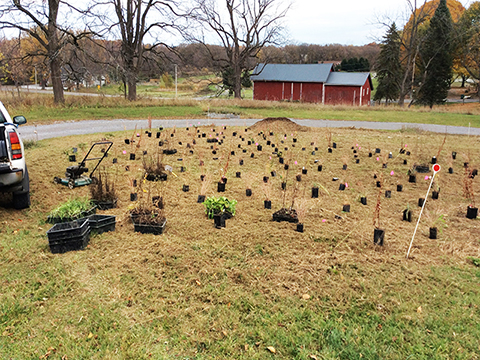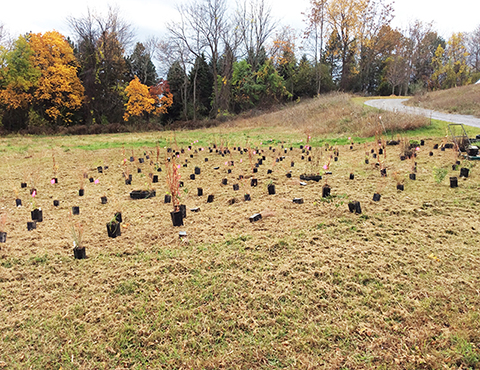 |
| Home | Ordering By Mail | Purchase Manual: Using Native Plants in Urban Landscapes |
|
|||||
Wildflower Meadow .
The first stage in establishing a wild flower meadow.
The clients had a long standing plant problem over their existing leach field.
The area was over run with perennial weeds and invasive tree seedlings (Ailanthus) that were causing maintenance problems.
I recommended establishing a native wildflower meadow that would solve both problems.
The first step was to eliminate the undesirable weeds and invasive trees by herbiciding the area several times over the summer.
The problem plants were still not under control by fall, but I recommended planting a smaller demonstration area
using container grown plants that were well established and would bloom the first season.
The demonstration area would give the owners something to enjoy while the larger area was being managed for weeds.
Because of the high population of deer in the area species were selected that were as deer reisistant as possible.
The plants selected will provide beautiful flowers and high quality wildlife value.
All plants are native and it is expected the plants, over time, will naturaly disperse their seed and help to colonize the surrounding area.
.

Over 350 plants were planted on 2 ft centers so the plants would fill in quickly preventing undesirable plants form getting a toe hold.
Meadow plants used
Grasses
Little bluestem (Schizachyrium scoparium)
Prairie deopseed (Sporobolis hertolepus)
Indian grass (Sorgastrum nutans)
Perennials
Nodding Onion (Alium cernum)
butterfly weed (Asclepias tuberosa)
Ox eye sunflower (Heliopsis helianthoides)
Beards tongue ( Pestemon digitalis)
Blue false indigo (Baptisia australis)
Prairie blazing star (Liatris spicata)
Rough blazing star (Liatris aspera)
Wild bergamot (Mondard fistulosa)
Ohio spiderwort (Tradescantia ohioensis)
Showy goldenrod (Solidago speciosa)
Wild quinine (Parthenium integrifolium)
Yellow coneflower
(Ratibida pinnata)